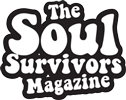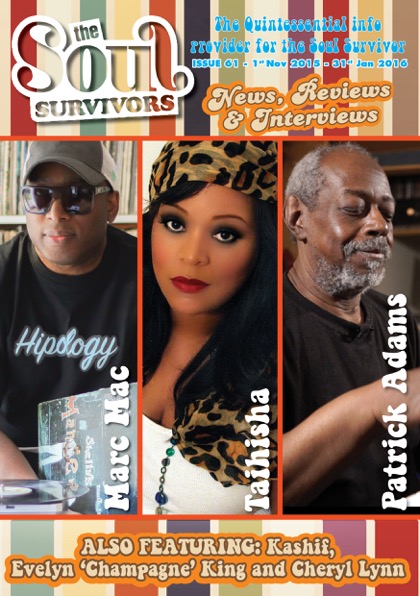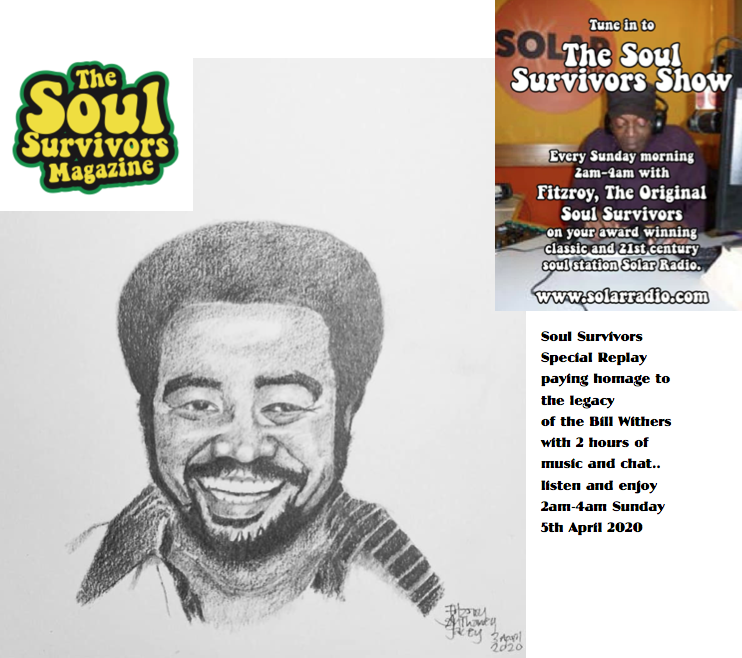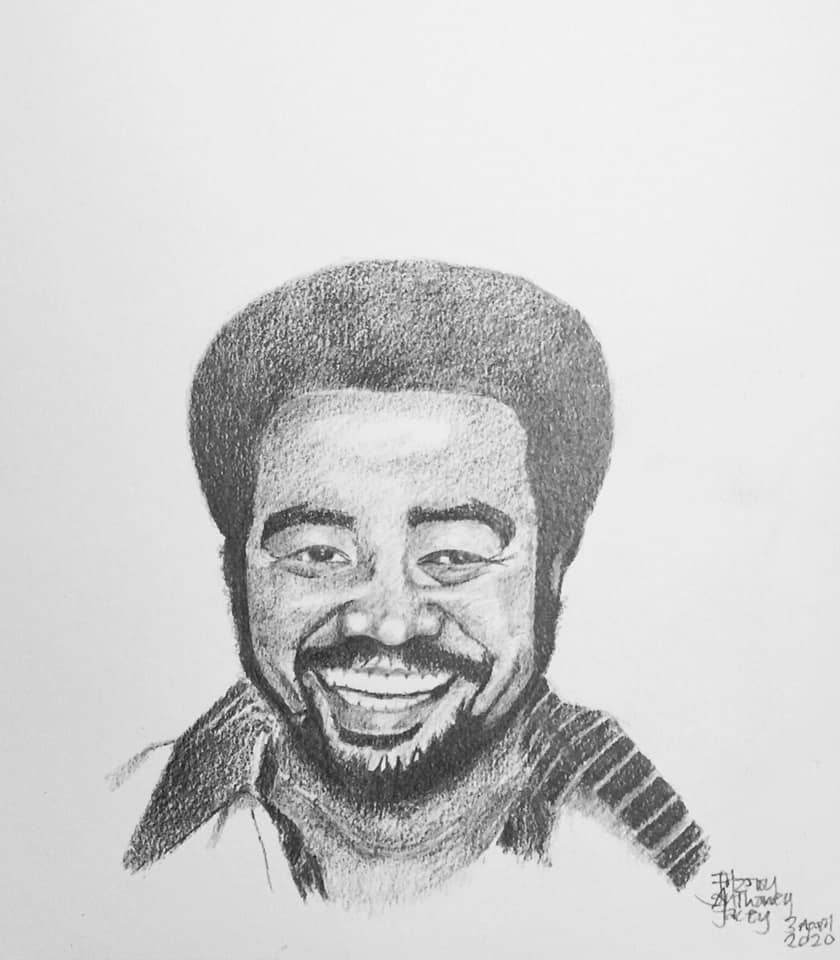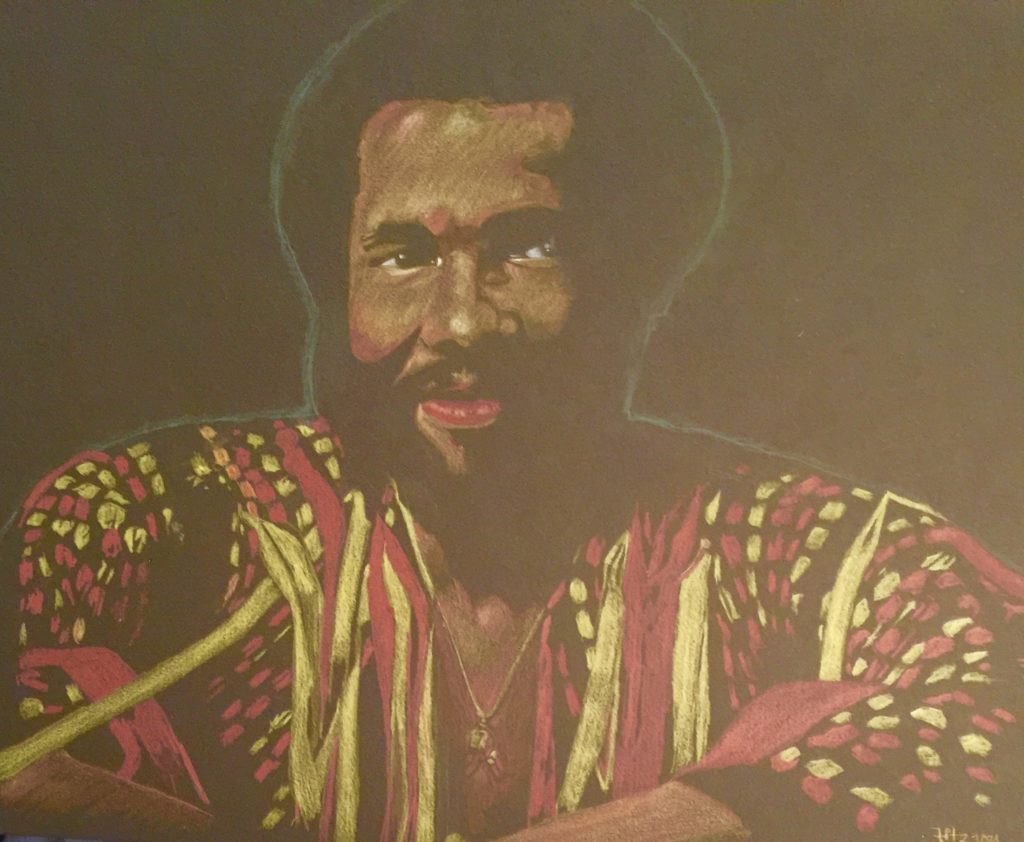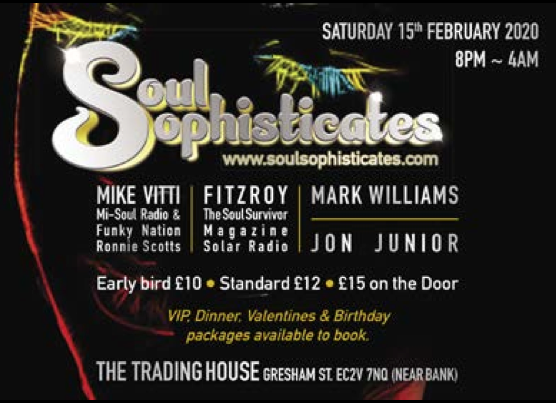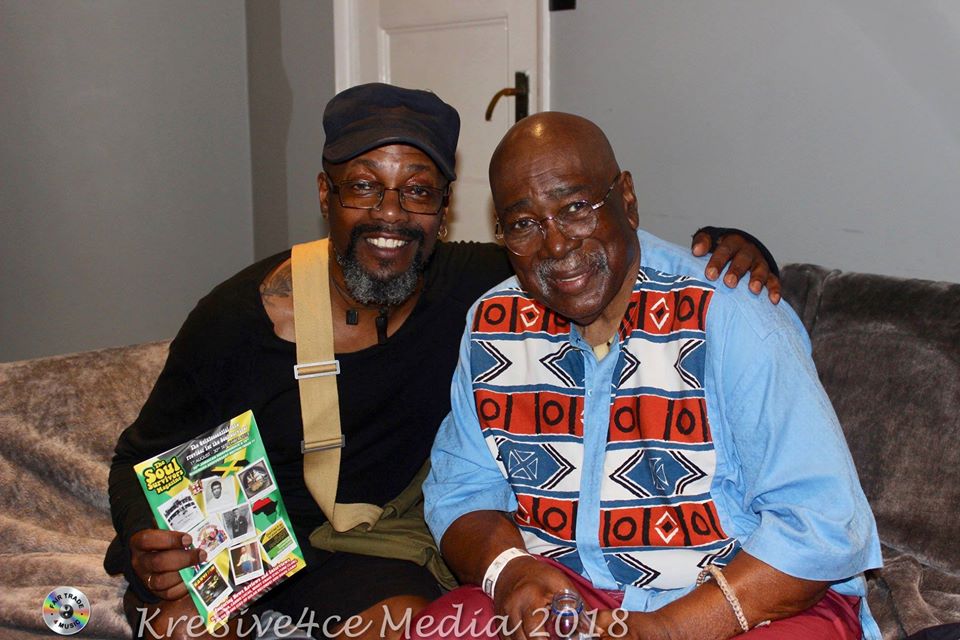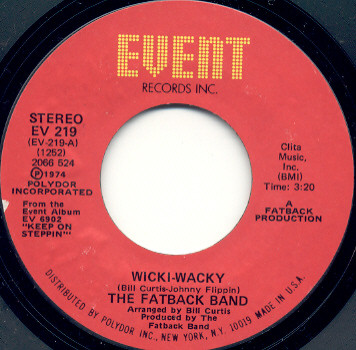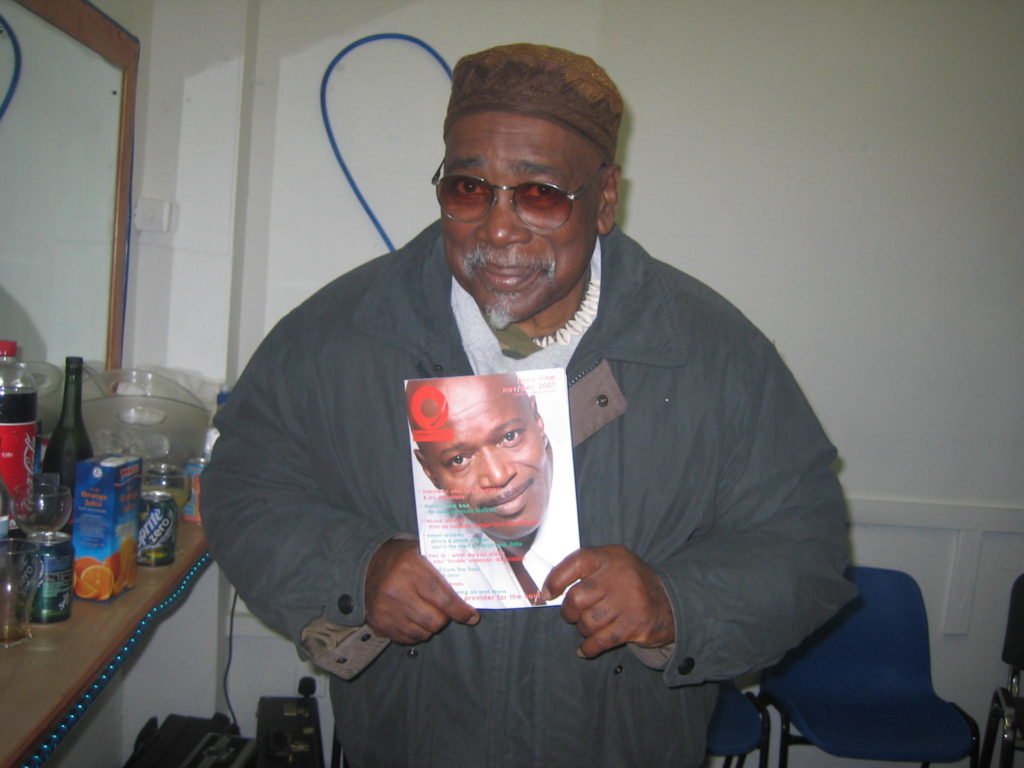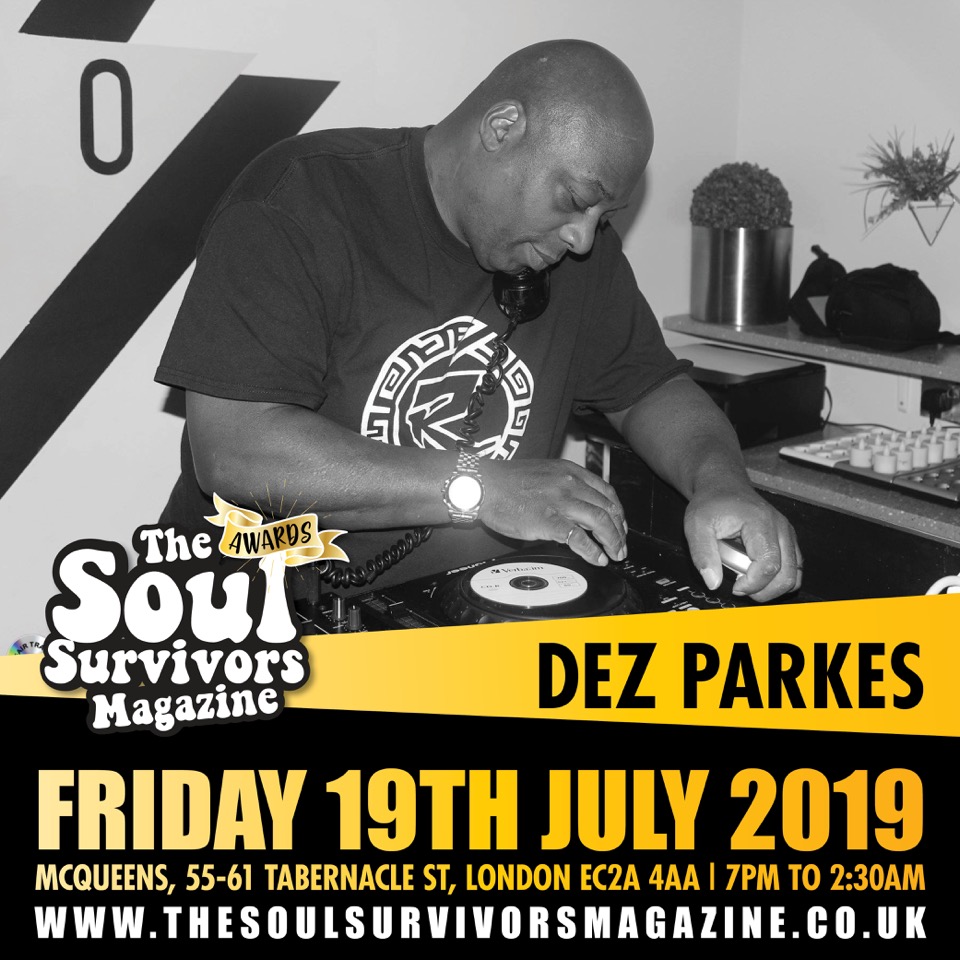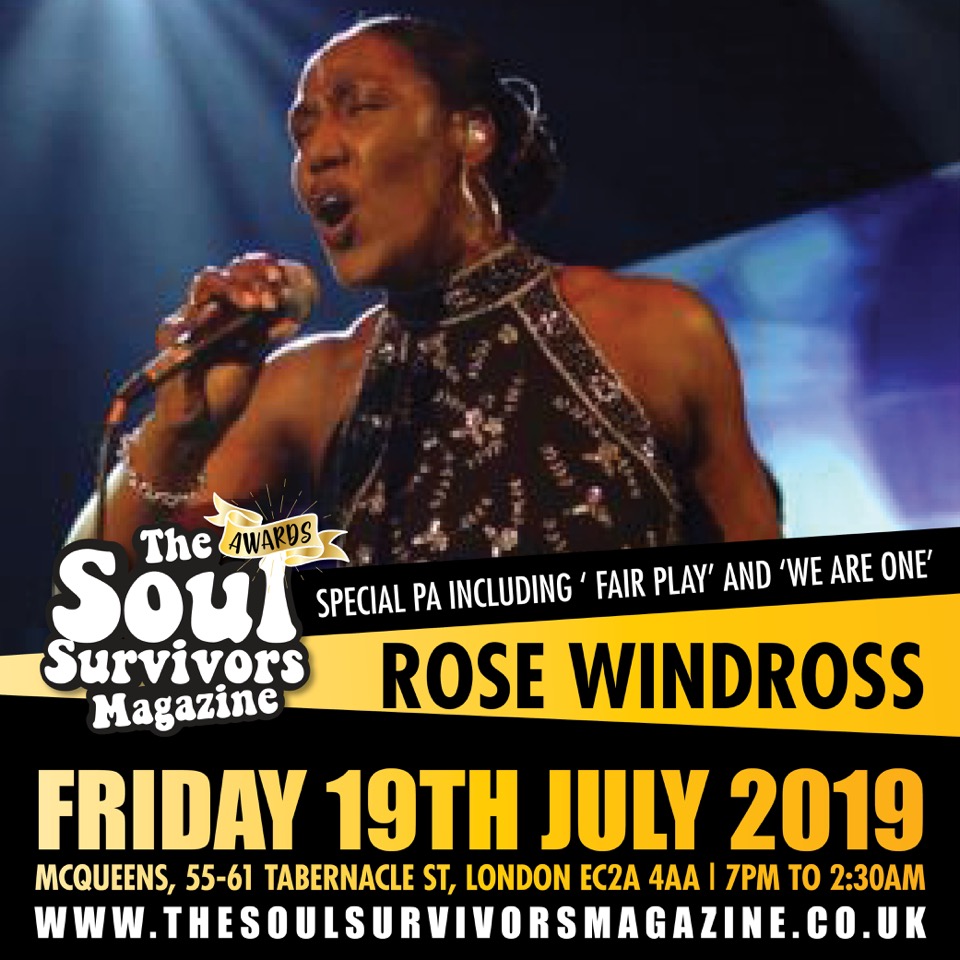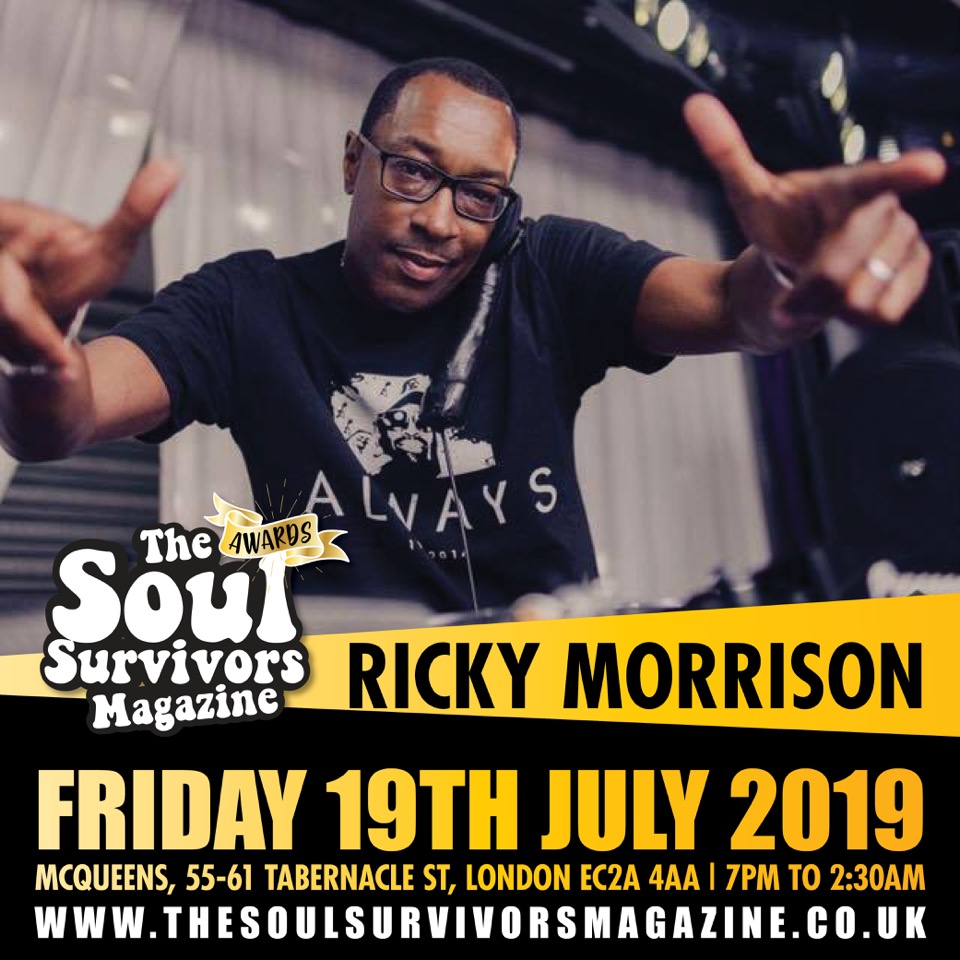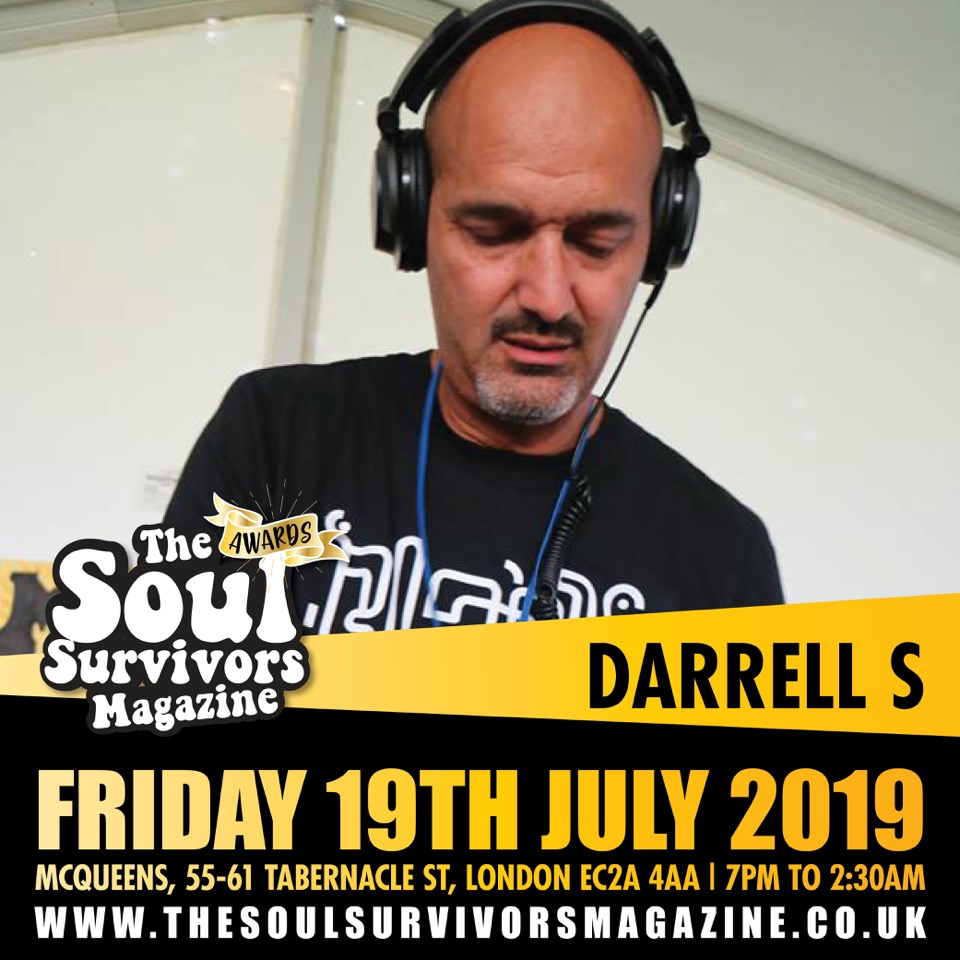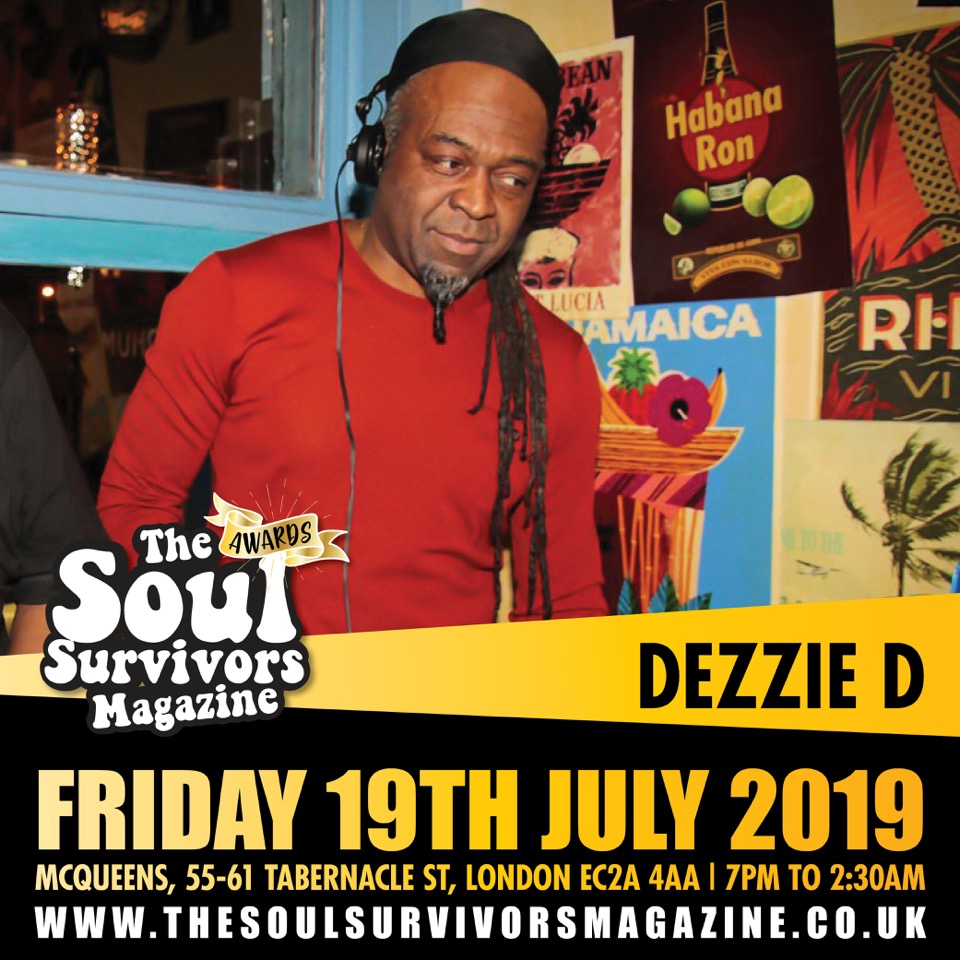 Greetings fellow soul survivors. Here’s an intro into today’s Friday’s Fitztory. Like many of my then teenage generation of the late 1970s and early 1980s, I grew up listening to Robbie Vincent Saturday morning 11.30am to 2pm in the afternoon, for what would be considered to be an essential listen. Fast forward to 2006 and having started the Soul Survivors Magazine with former co owner Anna Marshall, we mutually agreed at some point interviewing Robbie Vincent was on top of our hit list and was one of the most requested from our readers as a future feature.
Greetings fellow soul survivors. Here’s an intro into today’s Friday’s Fitztory. Like many of my then teenage generation of the late 1970s and early 1980s, I grew up listening to Robbie Vincent Saturday morning 11.30am to 2pm in the afternoon, for what would be considered to be an essential listen. Fast forward to 2006 and having started the Soul Survivors Magazine with former co owner Anna Marshall, we mutually agreed at some point interviewing Robbie Vincent was on top of our hit list and was one of the most requested from our readers as a future feature.
 Greetings on this pinch punch first of the month 1st May 2020. Today’s ‘Friday Fitztory’ works nicely as a prelude to my James Brown iSOULated Soul Survivors Showcase on Solar Radio this coming Sunday 3rd May James Brown’s 87th earthday 2am-4am. I’ll be hosting music, dialogue and chat via a few interviewees recollection in past Soul Survivors Magazine publications, who met and worked with Soul Bro Numero Uno! One fortunate young at the time teenaged artist Eddy Grant has an incredible story. Here is a smidgen of that story, the rest to be broadcast this weekend alongside the other tales of the unexpected. Read and enjoy.. Fitzroy Anthoney Facey
Greetings on this pinch punch first of the month 1st May 2020. Today’s ‘Friday Fitztory’ works nicely as a prelude to my James Brown iSOULated Soul Survivors Showcase on Solar Radio this coming Sunday 3rd May James Brown’s 87th earthday 2am-4am. I’ll be hosting music, dialogue and chat via a few interviewees recollection in past Soul Survivors Magazine publications, who met and worked with Soul Bro Numero Uno! One fortunate young at the time teenaged artist Eddy Grant has an incredible story. Here is a smidgen of that story, the rest to be broadcast this weekend alongside the other tales of the unexpected. Read and enjoy.. Fitzroy Anthoney Facey
Greetings this Flashback Friday. I sincerely hope everyone is safe and healthy in their safe iSOULAtion zones. Todays Friday Fitztory comes courtesy on an interview I did in 2016 for issue 61 with Marc Mac. He was featured on a first for us split screen front cover with singer songwriter Tahisha and the ‘disco messiah’ Patrick Adams. Marc is a west Londoner like me who under various aliases had released a few tiles I had in my collection unbeknown to me. Musically versatile and respected world wide. Here is a segment from our interview read and enjoy Fitzroy
Me: Your second album Parallel Universe is voted album of the year by NME in 1995 and a year later you remix Nu Yorican Soul’s cover of ‘Black Gold Of The Sun’. Louie Vega says it’s on of the best remixes’ he’s ever heard. I’ve got the Rotary Connection original and loved what you did with it as a cross pollinated balanced production of digital and analogue menagerie. What you achieved there is what Charles Stepney and The Mizell Brothers display on their amazing productions. This is why I cited you as one of 6 influential musician producer’s for Sky TV’s Culture Vulture Black History month special last year.
Marc: I’ve never thought of it like that but now I can understand exactly what you’re saying. At the time with Rotary Connection there was this thing of them interlocking soul with psychedelic music, and behind the scenes there was a pending thought of how to merge the two together. The Mizell Brothers were also trying to incorporate the synthesisers with jazz and I’ve read some artists like Johnny Hammond didn’t like what they were trying to achieve. So yes I can relate to having a battle bringing the electronic sound and sampling through intertwining with what people perceived as soul and jazz traditionally and presenting it in a new way.
Me : I loved the production of drum and bass because it reminded me of the Blue Note Prestige and Strata East quality, but on an independent label from the UK. How did you get the gig to remix ‘Black Gold Of The Sun’?
Marc : That was through Gilles being clever with us both being signed to Talking Loud. We did the ‘Le Fleur’ cover because Gilles did an article in a newspaper saying that no on could do that track, apart from maybe 4hero. Using that B Boy mentality we rose to the challenge. It’s an honour for Louie to credit us so highly for doing that mix. When Gus took the final mix of ‘Black Gold Of The Sun’ down to Talking Loud, both Paul Martin and Gilles Peterson had tears in their eyes upon hearing it. The icing on the cake was hearing from Charles Stepney’s daughter who had nothing but high praise on what we did and we are still in touch with them now.
To read the full interview you can purchase via this link
https://www.thesoulsurvivorsmagazine.co.uk/product/issue-61-november-january-2016/
Hi..here is the replay of this mornings show homage to Bill Withers for those who missed it or who wish to listen again. Also big thanks to the 250 plus who like the Bill Withers post and drawings yesterday. Listen and enjoy Fitzroy Anthoney Facey
Tashan-Soul Survivors
Bill Withers-Make Love To Your Mind
Still Bill Interlude
Bill Withers-Ain’t No Sunshine
Michael Jackson-Ain’t No Sunshine
Bill Withers-Close To Me
The Crusaders feat Bill Withers-Soul Shadows
Bill Withers-It Ain’t Because Of Me Baby
Bill Withers-Lovely Day(Rio Mix)
Gladys Knight & The Pips-Who Is She?
Bill Withers-Railroad Man (Phillip Modern Revisitation Mix)
Bill Withers-She Wants To(Get On Down)
Still Bill Grandma’s Hands Interlude
Bill Withers-Grandma’s Hands
Gregory Porter-Grandma’s Hands
Gil Scott Heron- Grandma’s Hands
Still Bill Interlude
Esther Phillips-Justified
Bill Withers-Harlem
Still Bill Interlude
Bill Withers-City Of Angels
The Beaujolais Band-Ain’t No Sunshine
Bill Withers-I’m Your Daddy
Bill Withers- I Want To Spend The Night
Bill Withers- Do It Good
Bill Withers-Where You Are
Bill Withers-Lean On Me
Bill Withers-Wintertime
Jimmy Lindsay-Ain’t No Sunshine
Bill Withers-Better Off Dead
Bill Withers-Naked & Warm
Morning all, like many fellow soul survivors I am saddened by the passing of ‘Still Bill’ Withers announced yesterday. Upon hearing I listened to all his albums I had at my disposal and watched again the brilliant documentary ‘Still Bill’. I will be showcasing some of this humble spirit’s music on my show on Solar 2am-4am tomorrow morning. The providential thing about Bill’s transition is that for a couple of years and recently during this lockdown (even earlier this week) whilst I’ve been drawing, l kept meaning to interpret his image from his not to be slept on 1977 ‘Menagerie’ album. So in my self iSOULated Bill Withers confined space, I put pencil to paper and here’s my Blue Peter one I made late but earlier yesterday. A true soul survivor Jedi maestro… long may your everlasting ‘Soul Shadow’ spirit be cast over this world.. Thank you Bill Withers for your gentle and universal spirit, sharing your gift to the world via music and poetry…Rest In Power ?❤️ #billwithers #thesoulsurvivorsmagazine
Greetings to you on this Flashback Friday. After having to put the magazine on hold due to the current pandemic situation and recent conversations with a few encouraging friends and fellow soul survivors, I’ve decided to use some of my musical experiences, articulacy and creative gifts and remain active, and create a new weekly Blog ‘Friday’s Fitztory’ to ‘Spread Love’ like Al Hudson & The Soul Partners. I’ve been fortunate to have deejayed for (and in many cases later) interviewed various iconic artists over the last 27 years. One of them is the man I call ‘Mr Vibes’ aka Roy Ayers. When the Jazz Cafe in Camden, London (circa 1993 onwards) started to host some of the musical messengers who shaped my musical mind, I was a resident deejay and often did many, if not all, of the multiple dates for the artists who performed. After the show I would go upstairs with my albums to get them signed and chat with the artists.
I remember meeting Roy Ayers’ then manager Dennis Armstead an old school American gent, who would greet me warmly and make sure I got to speak with Roy. I remember when I showed Roy my ‘He’s Coming’ and ‘Virgo Red’ albums. He would point out who was who, and who he sacked because they were indulging in drugs. At the time, I never thought of having ‘Candid Camera’ moments with him or any of the many artists, I was just happy to be in their presence, listen to stories and get my albums autographed. If I’d have had a Mystic Meg crystal ball and have known that in the next millennium I’d co-found The Soul Survivors Magazine, those experiences would have been priceless material. Fast forward like a TDK C90 tape, I did manage to interview Roy Ayers for our December 2013 – January 2014 edition and here is an extract which relates to a track from this Blue Peter front cover drawing I did earlier in the week. Read and enjoy. Fitzroy
TSSM: “I have 4 versions of ‘Sweet Tears’, one from David Fathead Newman’s ‘Newmanism’, one from ‘Let’s Do It’ 1978, the Nu Yorican Soul version from 1997 (with Louie Vega) and the first I believe was from ‘He’s Coming.’ I remember deejaying at one of your Jazz Cafe dates and you saying it was inspired by your Mother, how so?”
Roy Ayers: “Yeah it was inspired by my Mother and my Son whom I was leaving behind to travel on the road. Even though my Son stayed with my ex-wife, whose now deceased, he’d often stay with my Mother also. It was a heavy period for me so the words say “Baby though I’m leaving don’t you cry, I’m the one whose grieving, you know why, love is like the wild bird you can’t tie free to stay forever or to fly, though my heart will always stay, gotta make my getaway.” My getaway was to go on the road to entertain people. Wow, you’ve got a good memory to remember that.”
If you’d like to order the issue this came from to read the full interview then go to: https://www.thesoulsurvivorsmagazine.co.uk/…/issue-51-dece…/
Being Single and 50 on the Soul Scene
It’s interesting being back out on the dating scene after an 18 year relationship and I find that there are many people in their 40s, 50s and 60s who find themselves single for whatever reason so how do you find that new partner?
Two years ago when I started dating again my younger sister said to me ‘oh its all changed now people meet on dating apps, go for coffee and split the bill’, to be honest I was a bit worried as I’d always liked talking to people, having fun and if there was a spark and they asked me, going out for dinner and bottle of wine whilst we chatted and got to know each other better. I would also expect them to pay, even though I would offer to split the bill I would be surprised if they accepted and would be unlikely to go on a second date. Therefore how does online dating work for our age group?
OK so I tried Tinder, it was the only one I knew of in my defence but there are loads now Bumble, Zoosk, Elite, Match, eHarmony, etc. I did chat to some nice guys and lots of complete tossers too, I’m afraid but I suppose at least you can filter out a little bit before you arrange to meet. The thing I didn’t like was that it was all based on how you look which I don’t think is the best way to know if there is any chemistry. Attraction is based on lots of factors and for me I need to be able to talk to someone, to feel I can trust them and for them to make me laugh. I did meet up with one chap though and we went out for a few weeks then I decided that dating apps were not for me, although I do have a friend who met her now husband through one so I suggest you try it and see if it works for you. What have you got to lose, eh?
What next for real life daters?
I wanted to go out more, get fitter, have fun and make new friends whether that was friends to hit the dance floor with or someone as a potential partner so I started to go to soul nights on a regular basis. I had found my nirvana as the soul family have in my opinion always been the best of people, kind, caring, considerate, there is never any trouble or arguments so the atmosphere has always been positive and the most fun. I know that I have something in common with whoever I meet instantly (our love of good music), I can chat over the course of the evening and test out the chemistry on the dance floor before agreeing to give out my number, if they ask, of course. I also feel safe as I know lots of other people who would keep a vague eye and be there if anyone got a bit handsy. I have met so many new people and kindly been asked out on dates by some very respectable gentlemen who have always treated me very well. That is not to say that every relationship works out for whatever reason but that is the nature of the game, isn’t it? You’ve got to kiss a few frogs before you find your prince!
I wish all my single friends the best of luck in finding their Soul Mate.
Join me and my beautiful soul friends at Soul Sophisticates Valentines night on Saturday February 15th at The Trading House, near Bank, 8pm until 4am. Dinner packages, birthday, VIP and group bookings all available on Eventbrite at https://www.eventbrite.co.uk/e/soul-sophisticates-tickets-81754845945 or contact davina@soulsophisiticates.com or call Martyn at James Shoecare on 0208 550 1440
What music shaped your formative years between 1932 in North Carolina until you became an accomplished drummer, having relocated to New York City playing jazz, R&B and Bossa Nova in the 1950s and 1960s with Bill Doggett, King Curtis and a spell at Harlem’s Apollo Theatre?
Jazz, I was listening to Dave Brubeck, Sonny Stitt, Stan Getz and rhythm & blues artists like Paul Williams and The Griffin Brothers. Most R&B music was played by jazz musicians and every musician came out of R&B and Blues bands. You didn’t come out playing jazz straight away back in those days.
How old were you when you came to the East coast?
Straight out of high school, so I was eighteen.
What led to you setting up The House Of Fatback?
After working with King Curtis and those cats I was working up in the mountains doing cabaret with The Ron Allison Band. Playing cabaret I decided I wanted to create my own band and put together a three-piece group. I’d done a lot of recordings as a session musician and I ended up getting blackballed, so I started recording with my own band and other artists as a record producer.
Where does the term Fatback derive from?
Whilst working with the Ron Allison band we had the most popular session guitarist. His name was Eric Gale and I had a beat that he’d like me to play. He would say “Dude give me that greasy beat, that beat is like fatback man.” So when they asked for the fatback beat I knew what they meant and they ended up nicknaming me ‘fatback’ as I was the only one that played that kind of beat. I got that beat as a combination of a calypso beat with a backbeat.
How did you link up with guitarist Johnny King?
When I was putting the group together I was looking for a rhythm section. Whilst I was playing in the Jewish Kaskaskia Mountains at the weekends and during the summer in the hotels, Greg Decouder (who was a producer) was my roommate. He told me about how he had studied and analyzed the Motown sound and he had deduced that once you had a formula you stuck with it. I had a buddy called Warren Daniel who knew a guitar player called Johnny King. Johnny King and his bass playing partner Johnny Flipping had both worked with Bill Doggett. Earl Shelton on the horns came on board with George Williams and we remained together for thirty years.
This led to the Perception deal I take it?
That deal was a fluke as I was shopping the Fatback Band around town at all the record companies at the time when Warner Brothers and Atlantic Records were small labels. I bumped into a friend called Boo Frasier who advised me that he was just starting a label called Perception with a partner and I informed him of my group that I was trying to get a deal for. He hadn’t heard anything thing but I told him of an idea that I had to record some country and western funk and he liked the idea. I had no idea when I went to the studio what I was going to do but we did the album and they put it out. The tune people fell in love with was ‘Going To See My Baby’ but the radio stations didn’t like it as they weren’t used to that raggedy raw sound and no one would play it. So they took the record to the deejay Frankie Crocker who said that it was the funkiest thing he’d ever heard in his life. He started saying how raw and nasty the sound was and people started catching on. That record paved the way for groups like BT Express and all the little street bands like mine to come through. All the record companies were trying to get records to sound like the Fatback sound but they couldn’t get it. My sound was more underground and didn’t really take off until fifteen years later because everyone was used to the more over ground sound. When we went into the studio to record we had no idea of what we were going to play. Most people already have arrangements but we had nothing. I used to call it my live studio sound and I would bring people in and if they started dancing I knew we had the right groove. ‘Street Dance’ came from there too and our first single ‘Yeah’ and via each album you could hear our growth in the sound which got better as time went by. 
Off the second album ‘People Music Fatbackin’’ does sound like a cross between Kool & The Gang and Deodato’s ‘Rhapsody In Blue’. Both of which were released in 1973. Which was first?
Deodato copied me. You see a lot of the musicians in New York knew about Fatback because I was already in the recording world and every drummer copied that style and they would call it the fatback beat. It was the first of the disco beats.
I’ve spoken to Robert Khallis Bell of Kool & The Gang, Larry Blackmon of Cameo and Randy Muller of Brass Construction all of whom confirm that there was a big street funk fraternity out of New York and the East coast.
That’s right and Fatback opened the doors for that so the record companies wanted their own versions of that. What happened at Perception was that the label was going broke and our first two albums just about earned Boo the money he had borrowed from his family. He was going bankrupt and said it was nothing personal but he left us stranded without a deal. Whilst shopping for a new deal and coming out of Polydor records my lawyer hooked us up with Spring Records after looking at a dubious contract that Mercury was offering.
How did you form your longstanding working relationship with trumpeter/ keyboardist Gerry Thomas?
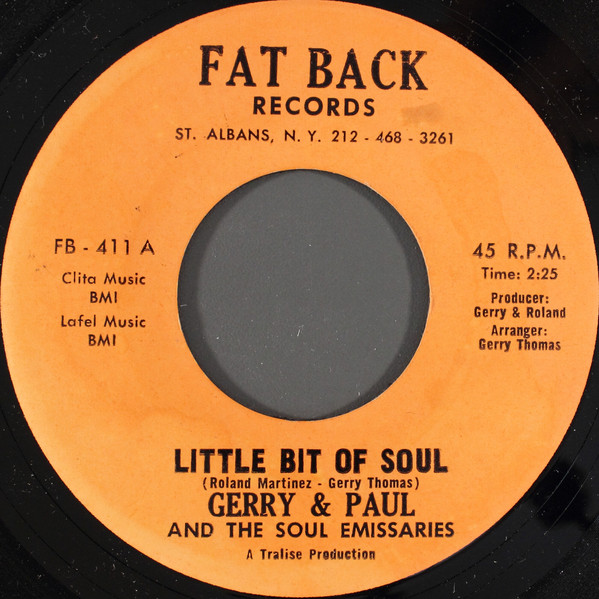 Gerry was one of the musicians that was in the band that I was in, featuring Eric Gale.
Gerry was one of the musicians that was in the band that I was in, featuring Eric Gale.
Oh I see so how did that work with you and him, was he moonlighting whilst working with Jimmy Castor?
No that is not how it went. He left Rod Allison’s group and went to join Jimmy Castor. In the meantime Gerry and I had formed a relationship producing records together on my Fatback label. When he wrote ‘Spanish Hustle’ he offered it first to Jimmy Castor but they couldn’t work out the right publishing deal so he gave it to me and we recorded that as a massive hit.
After the third and last Perception album you join Spring/ Polydor’s Event label. ‘Mr Bass Man’ is a killer but ‘Keep On Stepping’ and ‘Wicky Wacky’ would become the club anthems. By this time the bass lines of Johnny Flipping would simulate one of a reggae ilk on both those tracks. How much did the Caribbean and reggae influence have on the band, as much later this would be evident with ‘Spanish Hustle’ and ‘Night Fever’?
Remember what I told you I got my beat from?
Yes.
It came from reggae and calypso but what I did was put a two and four back beat to it, which the reggae didn’t have. Whilst playing at the cabaret dances the people loved calypso music and it was that with a New Orleans feel that influenced the Fatback Sound. Now if you listen to ‘Going To See My Baby’, four tunes came out of that like ‘Wicky Wacky’ and ‘Bus Stop’. At night we’d play the tunes differently and never the same way twice. So when we went to the studio we’d already written another tune on top of it and had performed it unconsciously but we were not aware of that. When you have a band that is working every weekend they are writing tunes in between.
When I hooked up with you at Southport in 2005 you told me that your track ‘Dance Girl’ was controversial with the Rimshots and that you were going to sue them, why was that?
They stole it and took my tune and didn’t pay me royalties and that is another one that came out of ‘Going To See My Baby’, you can tell. Remember what I told you earlier about the formula? That’s what I used throughout my Fatback career.
But they did credit you on the track eventually?
Yeah they did but I didn’t get any money. Not one penny but we worked out an agreement. Joe Robinson wasn’t the most up and up person in the world but he paid me back after I sent some people who represented me to talk to Joe and he ensured we performed with The Moments whenever they did a show.
Around the same time there were quite a few street funk bands establishing themselves like Kool & The Gang, Brass Construction and later Cameo, BT Express, Crown Heights Affair and Mass Production. All had a horn section but I think it’s fair to say that Fatback had an identity with your party hustle chants and Caribbean influences that stood out. Randy Muller advised me that he felt pressured when disco came in to write more lyrical songs. Did you experience that?
No, Fatback had no pressure and of all the groups out there I have more records than all of them apart from Kool and The Gang. We did about forty albums and I had the complete freedom to do what I liked. If I told them I wanted to put a dog on the record and that would sell they’d push it. (Bill laughs). That’s why my songs didn’t sound like others, when the others turned left, I went right and if they went straight ahead I went the other way. That’s why my music never really charted but when the deejays came in that’s where we became popular.

 ‘Raising Hell’ and ‘Yum Yum’ albums with their sexy funk, disco, jazz and Caribbean flavours remain two of my favourite albums that endured a degree of commercial success. ‘Raising Hells’ ‘Bus Stop’ created a dance craze to be capitalised five years later by another bullet on the future ’14 Karat’ album. How did you receive that adulation as this did catapult the group into the commercial arena more so I guess in the UK than the USA?
‘Raising Hell’ and ‘Yum Yum’ albums with their sexy funk, disco, jazz and Caribbean flavours remain two of my favourite albums that endured a degree of commercial success. ‘Raising Hells’ ‘Bus Stop’ created a dance craze to be capitalised five years later by another bullet on the future ’14 Karat’ album. How did you receive that adulation as this did catapult the group into the commercial arena more so I guess in the UK than the USA?
I never knew until Gerry Thomas came to the UK with Jimmy Castor and he said they played the hell out of ‘Bus Stop’. When I first came to England I toured with a little van and did bars and cabaret places in little country towns so I built my own following before I did big concerts.
I love the funky breaks created from ‘Put Your Love In My Tender Care’ a great track.
Whoa… that track never did anything and we never played that record live. Another one we didn’t do live was ‘Money’ until it became a hit. We had to go back and listen to the track and it took us two months to learn how to play it as we did everything as a one time take recording. The same with ‘Backstokin’’ a track which we went to court with with Dr Dre who sampled and contested his usage of it and we won.
Apart from ‘Party Time’ the one that always melts me is ‘Groovy Kind Of Day’
“Oh, oh, oh, ‘Groovy Kind Of Day’ came via our keyboard player and I wrote the words to it. We started the beat in the studio and I directed the bass player and the keyboard player who laid it down. In most of the tunes you hear, the track came first and then we would add the lyrics, then I’d add a rhythm or melody.
I remember you doing that at the Jazz Cafe around 2005 and I was so pleased you did it cause it sounded so amazing.
That day was the first time we did it as we questioned ourselves if it was too jazzy but we do it if we are in an intimate club setting now.
The ‘Yum Yum’ album is incredible with ‘Yum Yum’ as a ‘Bus Stop’ Part 2 in terms of a sing-along classic. But every track practically stands out with its own merit, in particular ‘Let The Drums Speak’ the sensual ‘Feed Me Your Love’, other favourites I used to like playing was ‘Hey I Feel Real Good’ and ‘Boogie With The Fatback’.
Bill interjects… If you wanna boogie you gotta boogie with the Fatback. We had such a raw feeling that everybody wanted to sound like Fatback. Now Bobby Robinson hired Johnny King to produce some records and Bobby asked for the Fatback sounds. Johnny said “You’ll only get that from Bill Curtis as it comes from the top of his head.” Johnny advised that he couldn’t do it stating that he didn’t think that I think like the average musician and that everybody follows my lead. Johnny later lost that producing job.
How did you recruit Phylis Hyman to sing the title album track ‘Night Fever’ that is very similar to ‘Spanish Hustle’?
(Bill laughs) I reach out to different people. Gerry and I knew Phylis who was a New Yorker doing lots of background vocal sessions. Gerry used to arrange his music on the way from his house to the studio on the subway and brought something different to the rest of the Fatback sound. He was the person who could interpret what I wanted, make it right and make it fit. He was the key to Fatback, as he knew how to implement my ideas. I wasn’t a singer but Gerry made people think I could.
My favourite off the ‘Man With The Band’ album apart from ‘Midnight Freak’ is the uplifting ‘Mile High’ which is not a typical Fatback sound but glorious.
That is one of my favourite albums but no one dug it but me and that is a bad thing when musicians like the albums that don’t do anything. However ‘I’m the Man With The Band’ (Bill laughs) came from another keyboard player who was blind and a friend of Deborah Cooper who wrote ‘Mile High’ and I wrote the lyrics.
What made you simulate ‘Bus Stop’ with ‘Double Dutch’ on the NYCNYUSA album? 
When we played ‘Bus Stop’ it morphed into ‘Double Dutch’ as the bass player would change the groove. When we recorded it I thought about the blue jump rope thing with the two ropes and the double dutch skipping thing.
Now named Fatback, the ‘Fired Up N Kicking’ album hosts the incredible ‘Snake’. One of our most respected deejays Paul ‘Trouble’ Anderson used to play that in a jazz funk set and everybody just moves to its infectious rhythms.
Oh yeah we did that during the Caribbean festival that was on every year in New York’s Eastern Park Way. That is one of my favourites and again we never played it live. We play it at dances because as a group we play all of our own songs and never anybody else’s songs.
What is the story of ‘King Tim 111’ the B-side of ‘the soothing ‘You’re My Candy Sweet’ that is credited as the first commercial rap song prior to ‘Rappers Delight’? 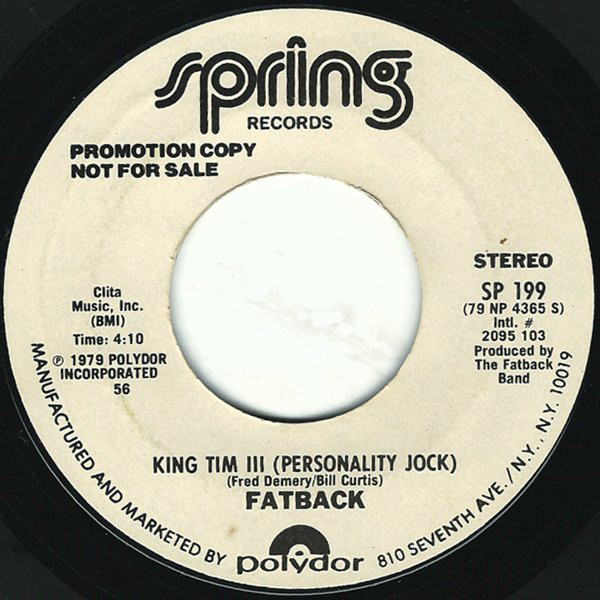
(Bill laughs) Well we did the album and I was listening back to it and I couldn’t hear a song that stood out as a hit. So I mentioned to Gerry that I had a tune and that I wanted to put a rap on it. He said “You can’t rap so watcha gonna do?” Our roadie said he had a friend who could rap so we got Tim in. We had the tune name as ‘Keep The Beat’ then changed it once Tim rapped on it. I then took the tune to a radio convention for the deejays with my friend Boo Frasier. I asked the deejays if they’d play it and they said yes as there was nothing else like it and it would change up the industry. I took the info to Spring Records for them to put it out but they said no in order not to offend the deejays they felt were already doing that. They would not support the track with any finance if I insist and wanted to push ‘Candy Sweet’. They eventually agreed to put Tim 111 as the B-side. Meanwhile Joe Robinson was in the studio pushing his music to the deejays and they were telling him that Fatback had the hottest track but that no ones was playing it as it was a B-side. Joe heard it and then went into the studio and did some shady stuff and got his track (‘Rappers Delight’) on the market three days later and the rest is history. After that Spring Records still refused to put it out saying Joe had too much of a head start but I told them they had it first, and that is the story. When I speak to them about it now they suffer from amnesia. (Bill laughs). The nearest thing after that we did was ‘Money’ but then I wouldn’t do the rap thing again cause I like to grow. I didn’t think rap would last that long but I certainty didn’t want to get locked in it.
As we come to the 1980s and the ’14 Karat’ album (which is my favourite of that decade) you have a new lead vocalist in tow. ‘Lets Do It Again’ is a great opener, ‘Angel’ a nice ballad and ‘Backstrokin’’ creates a new dance sensation with people swimming backwards on the floor. Did you know that?
(Bill laughs in disbelief) ‘Backstrokin’ wasn’t about swimming though!
I also liked the social messaged ‘Concrete Jungle’ as when I heard that it blew me away and reminded me of ‘Money (Gotta Get My Hands On Some)’, ‘Lady Groove’ and ‘Your Love Is Strange’ but the melter is the jazz bubbler ‘Chillin’ Out’. It is so sexy from beginning to end. What inspired that track?
(Bill laughs) ‘Chilling Out’ was a sleeper and we’ve never played that tune live either. People never picked up on that and I couldn’t get anyone to play it. People felt that those tunes were not Fatback but I wanted to show that we could be versatile in our musical direction. It came out like creatively just like ‘Groovy Kind Of Day.’ 
Exactly I loved it. I loved ‘Kool Whip’ which Robbie Vincent used to play regularly on his Saturday afternoon show. Now the Fatback sound was definitely changing, it still had the horns and was funky and by the next two albums ‘Gigolo’ and ‘On The Floor’ the moog bass and synths were rife and the horns had disappeared. So many bands from the east coast like Brass Construction Mass Production etc. lost their brass anchors too. How did you adjust to that?
We were moving into the electronic stuff and people didn’t want to pay for the big bands anymore, so using the synth we could still have a horn sound. I usually now carry eight pieces with me but now its around six as we cannot afford to pay for that now. Fatback is a musician band that improvises so the musicians have to bring something new to the band and improvise on a particular song so I don’t hire outside my band.
‘Is This The Future?’ was incorporating the new sounds more so and the title track was huge with its almost Grandmaster Flash ‘The Message’ type theme?
I wanted to move into another direction as I wanted to change my sound and that track was laid with the social message rap as a feature.
I did like ‘Sunshine Lady’ the more musical track from that period.
Ahh with ‘Sunshine Lady’ that was Michael Walker the lead singer and he fell in love with Linda Blakely aka the Mean Machine so he wrote that ‘The Girl Is Fine’ and ‘I Found Loving’ due to her.
Ok, that moves nicely into my next question. What did you think of the late Steve Walsh’s version of ‘I Found Loving’?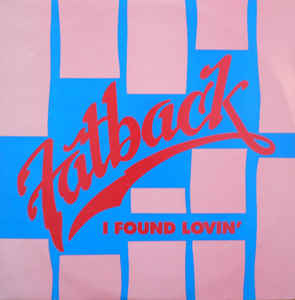
Steve was a friend of mine and he travelled with the band and he felt he could sing that song even though he was our MC. He asked if he could sing the tune and I had no objection and he brought new life into the tune. I have a live twenty minute version of us and Steve live from the Hammersmith recording, which the BBC recorded.
I’ve seen you a few times over the years at Baileys in Watford, Hammersmith Palais, The Jazz Cafe and Southport Weekender. Which venues hold the most memories for you having performed here for nearly forty years?
The Jazz Cafe and Baileys in Watford, I loved that venue and was sad when they went out of business those Baileys gigs were nice.
How did you hook up with Bah Samba to revamp the incredible millennium version of ‘Let The Drums Speak’ and ‘Spanish Hustle’?
The agent who booked me managed them and they wanted to collaborate with us. So both Fatback and Bah Samba were able to get both our names out there.
Did you mind doing that?
Well no because back in the day Heatwave approached us to come on tour with us and open up. They were good too and blew people away and made me step up my game and we’re still friends and they always show gratitude to this day as they toured England with us.
Which other bands did you admire?
I never listened to bands that much but I liked Heatwave, BT Express and Kool & The Gang. I liked Earth Wind and Fire and The Commodores but they were not street bands, they were very polished but I’m an earthy man from the street.
Thanks Bill it has been an amazing insight.
Thanks for calling me. I enjoyed the interview.
I have worked with all of these artist performing on Friday 19th July 2019 @ McQueen. Here is my brief synopsis of the history
Dez Parkes I call him the musicologist because of his advance knowledge and experience via his many tentacles he has touched in the music industry over more than 40 years. A proud East Ender who danced in the reggae circuit before he became one of the known characters in London’s Soho club circuit, Dez Parkes is one of the most respected DJ’s and connoisseurs of ‘Just Good Music’. As a multitasking DJ, dancer choreographer and label owner, Dez complied the pioneering ‘Rare’ albums on RCA Records circa 1987. He has travelled the world and is respected world wide via his DJ sets and radio shows. Artists like Leroy Burgess and Roy Ayers regard Dez as a personal friend and seek his counsel as well as giving him props for championing and helping to spread their music. Dez will be spinning an eclectic selection of Just Good Music flavours on Friday 19th July at The Soul Survivors Magazine Awards at McQueen in EC2.
Marc Mac Marc Mac another fellow west Londoner is a pioneer in finding the perfect equilibrium between analogue and digital music production and compositions. One of the main protagonists of the drum & bass and jungle explosion in the 1990s and part of 4hero, Marc has excelled as one of the UK’s universally respected DJ producers around the world. His label Reinforced is a world wide successful entity with a back catalogue that is constantly in popular demand. Marc has worked with many A list artist and outfits including Roy Ayers, Terry Callier, Jody Watley. Masters At Work and Ursula Rucker. Marc will be spinning variety of flavours on Friday 19th July at The Soul Survivors Magazine Awards at McQueen in EC2.
Rose Windross Hailed as the ‘First Lady Of Soul II Soul’ Rose Windross is a unique soul survivor with an instantly distinctive vocal delivery upon any track she performs live or as a recording. Rose is the respected dancer first, singer second, like those recognised as dancers first before they became DJs. Albeit she is an out and out jazz funk disco and boogie die hard, Rose made her recording debut in the lovers rock arena as a teenager before she caught the world attention with her co written ruff rugged and raw London beat classic ‘FairPlay’ circa 1988. Rose has been an in demand lead vocalist on various projects in the soul funk, UK garage and house genres over the last 30 plus years and still boogies hard on the dance floor and while she is performing. Celebrating 30 years of recording ‘Fairplay’ Rose will be our special PA on Friday 19th July at The Soul Survivors Magazine Awards at McQueen in EC2.
Ricky Morrison I’ve known Ricky Morrison a local West London Wembley music enthusiast since he used to come to my late teenage birthday parties in the early 1980’s, when I used to spin off one deck. Ricky was part of a sound system collective called The System Inc in the mid 1980s and eventually struck out on his own and getting into house music production, one of his earlier pseudonyms was 2 Dope Productions and later on as M&S Productions with lifetime friend Fran Sidoli. Ricky also did some of his apprenticeship working in a few of the west end of London’s premier record shops supplying DJs and music lovers with the latest imports which culminated in co owning Catch A Groove Records along with Abbey Shah. Ricky as well as travelling the world DJing in Europe and the USA Miami Conferences he has remixed many projects as well as enjoying success with his M&S project Salsoul Nugget chart selling ‘If U Wanna’. Ricky is resident at McQueen and will be spinning some soulful house with a disco boogie flavour on Friday 19th July at The Soul Survivors Magazine Awards at McQueen in EC2.’
Darrell Steaman
Darrell Steaman is an all round music loving kind of soul survivor. He’s been DJing for around 30 years, an occupation he had no intention of entertaining, however being asked to fill in for a friend it became his passion. Playing initially local in his Oxford manor, Darrell has travelled further around the country and in Europe as well as hosting radio shows with a jazz funk soul and broken beat flavour. He is also well travelled attending numerous events around the country, weekenders all nighters and specialist nights. Darrell’s satirical Funkbox column feature has been running since the magazine started in 2006 and he has also played at previous Soul Survivors Awards we’ve held over the last 10 years. One of the industries funniest and nicest gents, Darrell will be spinning on Friday 19th July at The Soul Survivors Magazine Awards at McQueen in EC2.
Dezzi D Dezzi D and I were teamed together in December 1990 by our awards artist PA Rose Windross to work with her brother Norris Da Boss Windross at weekly Wednesday night at Soho Theatre London W.1. Ever since we have worked together at various events and I’ve witnessed his ill skills in the mix spinning an amalgamation of 1970’s to the millennium recordings. He has been for the best part of 40 years a very in demand across the board DJ holding long residencies at various establishments UK and beyond. Ticking the jazz funk disco boogie hip hop, house RNB and broken beat genre boxes Dezzi D will be spinning his flavour on Friday 19th July at The Soul Survivors Magazine Awards at McQueen in EC2.
Jon Jules and I have much in common being born in north west London, loving music and supporting the COYS. I first came across Jon buying music off him in the mid 1980’s whilst he worked in R&D Records Rayners Lane. He later co owned the shop and was a familiar DJ character working the home counties and London’s west end. Jon also is a recording artist and a remixer and is very knowledgable installing sound systems for major companies in major clubs and venues around the country. After a sabbatical from the scene he has returned with a vengeance and has made quite an impression securing work around the country and and outside. He was runner up for Best Club Dj in our 2017 held awards at Under The Bridge and is up for best radio show in our forthcoming 2019 event. A very liked individual catch Jon spinning an array of music with a disco boogie flavour on Friday 19th July at The Soul Survivors Magazine Awards at McQueen in EC2.
